“Did you enjoy that wilderness in Pukaskwa?”
(10:13) Oh, it was fabulous! It was absolutely fabulous, except for the black flies and the mosquitoes and those types of things. I enjoyed the boating on Lake Superior immensely, I always liked boating. I enjoyed the helicopter work we did, the caribou surveys, the annual moose surveys, things like that. I think the boating and being able to be a part of that north shore of Lake Superior and the beautiful Canadian Shield in different seasons was just amazing!
“And your wife did she enjoy it?”
She enjoyed i. I think she enjoyed getting into a townsite after the four years at Marble Canyon, although we did like it. When we moved to Marathon, we did have Scott who was six or seven months old and shortly after we got there we had our daughter, Suzanne. In August of 1974 we had our daughter and it was nice to be in a townsite with kids growing up. And school and (playing) with other kids. They went to school until they were eight and nine in Marathon, right in the town. It’s a fairly small town, but well established with all the amenities that we needed.
“What were some of the challenges when you were in Pukaskwa?”
One of the big challenges was getting to know Lake Superior You didn’t just take a little 14 foot boat out on the lake, like you used to. Gitchi-gumee, which I believe is the Indian name for Lake Superior, it’s in a Gordon Lightfoot song, the Edmund Fitzgerald, was a hard lake to get to know and you had to respect it. We all took short cuts, often not knowing that we were taking short cuts. I think when I look back at the boating that I did on Lake Superior, and (the boating) that some of the other guys did on Lake Superior, I don’t think that we were really well prepared enough for doing that kind of work because of the dangers. It was just so uncertain when you get out on the lake. Things can happen so fast. So that was one of the big challenges that we had. I think one of the other ones was getting to the places, since we had to go by air or boat. One of the other challenges of course, was the park wasn’t gazetted. We had to use the provincial Trespass to Property Act, and that was a little tough at times. But there were so few visitors in the park, that it wasn’t a major issue when I was there.
“Was Mac the chief when you were there?”
Mike Schintz was my first Chief Warden and shortly after Mac arrived. I didn’t know Mac at the time, but I got to like him and worked well with him and up to this very day, he is a very good friend of mine…
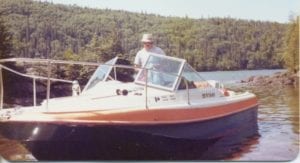
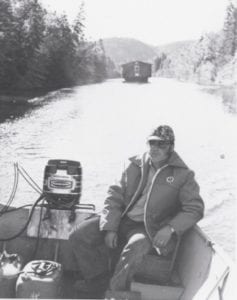
Greg Keesey on Lake Superior. Trail Crew Barge Camp in Background – Pukaskwa National Park
“So you were there nine years?”
(14:44) Nine and a half years. Our parents were all in Saskatchewan. My wife’s parents were in North Battleford and mine were in Regina. We had spent most of our holidays in that nine and a half years going back to Saskatchewan to see family and we really didn’t spend a lot of the time seeing the country like we really wanted to. We had a yearning to get back to Saskatchewan. Our parents weren’t getting any younger and our kids were getting older. We wanted our kids to get to know their grandparents. Some of the people, Ron Hamilton was my Chief Warden at the time, and he and Doug Hodgins who was the Superintendent really went to bat for me. Bruce Wilson took me in and we moved to Waskesiu in October of 1983. I was looking forward to working with Bruce Wilson, but he was gone.
“Where did he go?”
I think he went to regional office in Winnipeg, but I am not sure. I have to say that when Kate Stefaniuk was showing me around Waskesiu, the very first day she introduced me to all the other wardens and took me into their offices or wherever they were and introduced me to them. I knew a few of them and when she showed me to my office and was ready to leave, I said, “Where is Ron Davies?” She said, “He is in Fort Chip.” She said, “You replaced him.” So I was very disappointed because he had been my first area manager in Kootenay…and then he moved back to Waskesiu and I was looking forward to working with him. The whole time I was being transferred to Waskesiu (I thought) “I am going to work with Ron Davies again, this is great!” And I missed him…Ron was excellent at working with the native people. We almost felt at times that he was half native himself, he really understood them and worked well with them.
“At Waskesiu what were some of your responsibilities?”
(18:06) I was basically public safety and law enforcement. I was kind of the self-proclaimed public safety officer shortly after I went there and I kind of retained the status until I left. One of the challenges in Waskesiu that I faced was the local fire department in the townsite of Waskesiu. Because we had a lot of staff houses and the administration buildings, the fire hall belonged to the park. We were all volunteer when I went there, we started getting less volunteers and less volunteers to the point where there was hardly anybody there anymore. I’m just forgetting the sequence, but part of my job description ended up being the Fire Chief. Like a lot of things that happened, if you expressed an interest they gave you the chance to do that, but there was no more time or no more pay of course! You were expected to do it once you took it on. That happened with a couple of things including being a first aid instructor. I was the Fire Chief for a while, as a volunteer I believe first and then as part of my duties.
“With the public safety was that again a lot of things to do with water?”
(20:00) There were a couple of issues public safety wise in Waskesiu, but not at lot. (There was one drowning situation on Kingsmere Lake, but I wasn’t stationed at Kingsmere at the time. I wasn’t really involved in that except for one day when Bill Browne and I went out to set up a grid search. I was involved in other things. There were several lost and overdue people. Back in those days with the registration system the way it was, we were continually checking trailheads in the evening and babysitting people. There were lots and lots and lots of people who were glad to register before they departed into the backcountry, but too interested in getting to the bar when they got home to register back out. Of course we were checking the trailheads every night and people were missing all over the place and we were calling all over the place. We were calling the RCMP and half the time they were on their way home, or at the bar, or over at their friends place or something like that. So a lot of overdue people, but not a lot of lost people, not a major situation that way.
“Were there any wildlife issues when you were at Waskesiu?
(21:44) Wildlife issues, I can’t think of any major wildlife issues.” I wasn’t involved in the resource management end of things very much in Waskesiu. The bison, they had reintroduced the bison into the wild and closed the buffalo paddocks. The buffalo really took off in the wild, but I wasn’t involved in that directly.
“Is that where you spent the rest of your career in Waskesiu?”
(22:34) Yes, until 1998 I guess. In 1996, I was offered the golden handshake or the buyout. I decided to take it which I often regretted later for various reasons that I won’t get into. I took part in that golden handshake at the same time Keith Foster did, Keith was in Grasslands. At the time Jim Masik, I guess his title was Chief Warden for the province, they had centralized at that point and he indicated in two years which was when I was going to turn 50, I could have a buyout. Shortly after that they realized that the Superintendent was not supposed to have cut the warden service. Meanwhile, my wife Jackie, her job had been moved to Saskatoon in Accounts Receivable and we had bought a home. Jim had told us to go ahead and get the home, everything was secure and so we did. Shortly after that I found out I couldn’t have my buyout and I was wanted back in Waskesiu, so for the next year and a half, I commuted from Waskesiu to Saskatoon. About two and a half hours, every weekend I commuted. Lo and behold at the end of the buyout period which was April 1, 1998, just before that they actually granted me the buyout and we moved to Saskatoon.
“So you officially retired in 1998?”
In 1998, I was actually 50 just before that, I was 50 in 1997. But it took a while to get my buyout.
“Do you have a favorite of the parks you worked in?”
(25:09) I get that an awful lot and I absolutely can’t say that I did. They were all so wonderful, the diversity, the beauty, the wonder of all of those parks, the variety of experiences I got in each one of them just made them all special. The three were so different.
“What did you like best about being a warden?”
(25:55) I used to get that a lot as well. One of the things that I liked the best was the fact that we didn’t just have one job or one duty. You probably get (that answer) a lot. One morning, I might be doing a highway patrol. At 10:00 in the morning I might be dragging an elk off the highway, or going out to Lake Superior to pull a body out of one of the river mouths or something like that. In the afternoon, I might be doing up a report on something else or helping the Chief Warden, or area manager, with budgets or whatnot. There was boating, there was aircraft work, there was helicopter work. The variety and diversity was amazing. The other thing that possibly tops that is being able to talk to people. Often times I prided myself on being able to approach a situation where, for instance in Waskesiu we worked with the Chamber of Commerce whose members had quite a different outlook on what should happen in a park townsite, than us. I would meet them on the street and they would start ratting on me, or ratting on the park, or ratting on the Superintendent about doing this or doing that and why did they do that and who the hell do they think they are! I remember one situation where one of the Chamber of Commerce people was doing that. I just stopped for a minute and I looked at him and I said, “You know, I can see your point of view. But did you ever think for a minute that we don’t just sit in our offices and dream up these things. There are reasons for them. The reason that this is being decided is maybe this and this and this. I think you should think about that and try to understand not just where you are coming from, but also where we are coming from. And think about the Canadian public.” He looked at me and he said, “You know, I guess I need to do that.” He was one of those people who was really hard headed and who I never, never believed would say something like that! So I enjoyed talking to people and I enjoyed going into places like Beaver Glen Campground in Prince Albert National Park after a heavy drinking night of partying and vandalism and everything and talking to people who thanked us for going in and settling down the site next to them. They would often say, “You know we had decided that we were never coming back, but you guys came in and settled everything down and it is a nice place again.” That was probably one of the best things about the work that I had. I do have to say, that I believe in 28 and a half years in the warden service there was only one time that I thought that I really wanted to quit. That was a one-day incident because at the end of the next day it all changed and I never felt that again, not once…
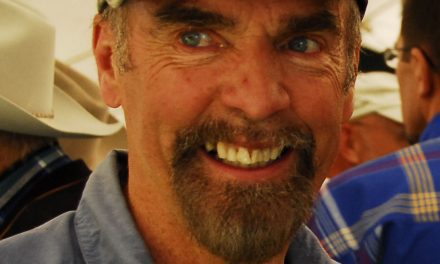
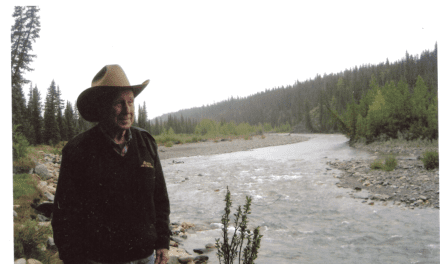

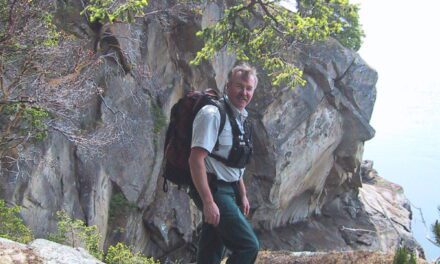
Hi Folks,
I loved this article. I grew up in Unity with Greg Keesey
Reading this article really tugged at my heart strings
I live in Toronto now where I have been since 1972
Please say Hello to Greg for me.
Cheers,
Rick Tufts